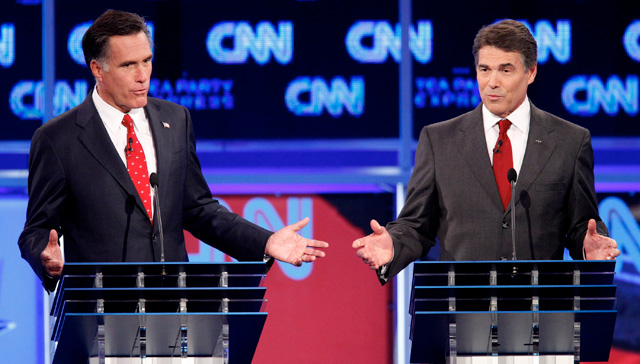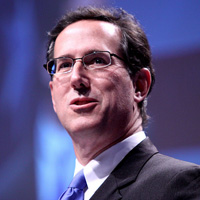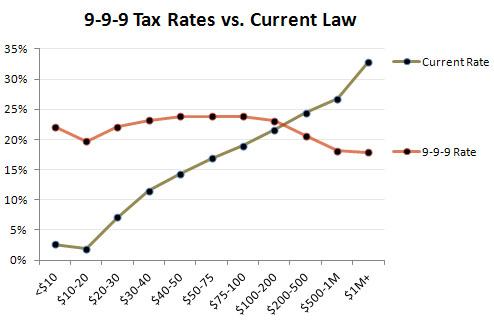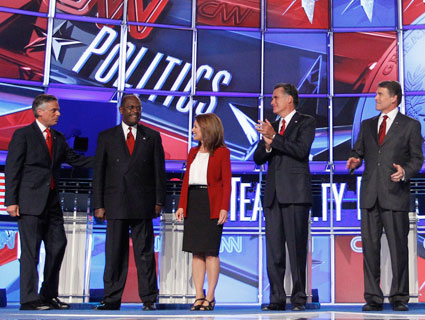 Mitt Romney and Rick Perry at the CNN/Tea Party Express debate on September 12, 2011. Edmund D. Fountain/St. Petersburg Times/Zuma Read on for the Mother Jones news team’s instant analysis of Tuesday night’s GOP presidential debate in Las Vegas.
Mitt Romney and Rick Perry at the CNN/Tea Party Express debate on September 12, 2011. Edmund D. Fountain/St. Petersburg Times/Zuma Read on for the Mother Jones news team’s instant analysis of Tuesday night’s GOP presidential debate in Las Vegas.
 Gage Skidmore/Flickr
Gage Skidmore/Flickr
Why Romney Slammed Perry So Hard
You can always tell what a campaign thinks by whom it attacks.
At the Republican cluster-smackdown in Las Vegas on Tuesday night, the fists were flying. The evening started with Michele Bachmann and Rick Santorum pouncing on Herman Cain. Then the others piled on in a Cain-bang. This was natural, given that Mr. 9-9-9er had vaulted over all the other second-tier candidates into first place in recent polls. They bashed his 9-9-9 scheme on various fronts, and, no doubt, Cain, though he took the blows good-naturedly, left with more chinks than when he arrived.
But the most interesting assaults of the night came from Mitt Romney—and they were aimed at Rick Perry. Again and again, he manhandled the Texas governor, who is in single digits in recent voter surveys. Every time, Perry took a poke at Romney—on jobs in Massachusetts, on using a gardening firm that hired undocumented immigrants, on whatever—Romney was ready for him and slammed him in response much more effectively.
This showed a few things.
- The Perry campaign’s opposition research operation was lame. Perry was not well prepped. The material it handed Perry was weak. And he bobbled the oppo research he had been fed.
- You can’t discount experience and professionalism. Romney was ready to rumble. He had the facts (or semi-facts) at his finger tips when he needed to defend himself or go on the offense. This was a sign he has a top-notch crew behind him and that he has grown into a better debater after campaigning for several years. Practice does work (except, it seems, for Perry, whose debate outings have gotten worse).
- Romney is worried about a Perry comeback. I didn’t clock it, but it sure felt as if Romney spent more time with Perry in his sights than Cain. This would suggest that Team Romney considers Cain still the flavor of the nanosecond who will eventually flame out. And if Cain is sucking up the oxygen that would otherwise fuel another anti-Mitt candidate, that’s fine by Romney. In all likelihood, Cain won’t have the money, organization, or staying power to threaten Romney.
- Perry, though down and out (and downer and outer after this debate), could still revive—if only because he has the bucks to rebuild. He does have the money to wage a monumental ad campaign against Romney. While you can’t buy a good debate performance or talent for the candidate, you can buy a good ad team and talented strategists. Perry has the resources to inconvenience Romney greatly. And when the voting starts, the anti-Romney support will have to settle somewhere. If Perry is at all viable at that point, Romney will have to worry.
Consequently, Romney aimed to kick the Texan while he was down. He did a pretty good job of it. It demonstrated that the former CEO has a strategy and the ability to execute it—which, so far, cannot be said of Perry.
 Gage Skidmore/Flickr
Gage Skidmore/Flickr
Rick Santorum Slams Cain on 9-9-9—and He’s Right!
Since when did Rick Santorum become the champion of the middle class? At Tuesday’s GOP presidential debate in Las Vegas (the eighth in four months, if you’re scoring at home), the former Pennsylvania senator led the charge against newly crowned front-runner Herman Cain, alleging that Cain’s 9-9-9 tax plan was the last thing middle-class Americans need. Prefacing his attack with the obligatory, “Herman, I like you,” Santorum stated that the tax plan, which replaces the entire tax code with a 9 percent national sales tax, 9 percent income tax, and 9 percent payroll tax, would significantly raise taxes on all but the highest earners.
From there, the rest of the field piled on. Rep. Ron Paul (R-Texas) called the plan “regressive” because of the impact it has on low-income earners. Texas Gov. Rick Perry, happy to see someone else become a punching bag for a change, chided Cain for adding a national sales tax on top of existing state sales taxes. And Mitt Romney, pretending not to know the answer to the question, asked Cain if the federal tax would replace all state sales taxes. When Cain told him no (that video clip will come in handy), Romney announced he was against it.
So who’s right? Santorum—and it’s not even close. Just check out this chart, from the non-partisan Tax Policy Institute (via Kevin Drum).
 Data from Tax Policy Institute
Data from Tax Policy Institute
Santorum went on to call for a renewed focus on a lack of “income mobility” in the United States, noting that it’s easier to pull yourself up by the bootstraps in Europe than in the United States. So there you have it: Rick Santorum is the Zuccotti Park candidate.
 Gov. Rick Perry/Flickr
Gov. Rick Perry/Flickr
Perry Takes Romney to Task Over “Hiring” Illegal Immigrants
Ever get the feeling that Rick Perry’s oppo research team has been failing him? During Tuesday night’s tense CNN debate in Las Vegas, the Texas governor took Mitt Romney to task for the “hypocrisy” of trying to appear tough on illegal immigration while also having allegedly hired undocumented workers to tend to his posh estate in Belmont, Massachusetts.
Referencing a series of reports published by the Boston Globe in 2007, Perry had this to say about his fellow GOP contender: “Mitt, you lose all of your standing in my perspective for hiring illegals in your home and knowing about it for a year. And the idea that you stand here before us and talk about your strong record on immigration is, on its face, the height of hypocrisy.” Romney laughed off the attempted smear and said that he never “hired an illegal in my life,” before the two went on to trade remarks on the matter. Here’s video of their exchange:
Unfortunately for the increasingly faltering Perry, his latest barb for Romney turned out to be a cheap shot that—given the angry groans and hissing from the audience—Perry couldn’t even pull off. By rehashing this nearly four-year-old quasi-controversy, Gov. Perry opened himself up to an easy rebuttal: According to the Globe‘s exposé, Romney did hire Community Lawn Service With a Heart, a landscaping company that had a track record of employing illegal immigrants, for services like “raking leaves, clearing debris from Romney’s tennis court, and loading the refuse onto [their] truck.” He did not, however, directly or (according to Romney) knowingly hire any undocumented workers, and he dumped the company after the Globe broke the story. After hearing the news, the Romney ’08 campaign issued the following statement:
[The company was] instructed to make sure people working for [them] were of legal status. We personally met with the company in order to inform them about the importance of this matter. The owner of the company guaranteed us, in very certain terms, that the company would be in total compliance with the law going forward. The company’s failure to comply with the law is disappointing and inexcusable, and I believe it is important I take this action.
Whether Romney was telling the whole story or not (Ricardo Saenz, the company’s owner, had a different version of the facts), PolitiFact ruled on this controversy years ago and concluded that then-candidate Romney deserved “a little slack for doing what most Americans would do and rely on the legal status of the company hired to do the job.” Objectively speaking, Romney’s yard-work-gate is, at worst, an example of bad household oversight—not exactly the kind of criminal exploitation the Perry campaign was surely banking on.
About That Immigration Study Mitt Romney Cited…
—By Tim Murphy
The most dramatic* moment at Tuesday night’s GOP presidential debate came past the midway point, when Rick Perry and Mitt Romney clashed over illegal immigration. In addition to consistently referring to undocumented migrants as “illegals,” Romney went on to suggest that Perry’s record of job growth in Texas was comprised mostly of illegal immigrants. Romney cited a study showing that 81 percent of new jobs in Texas over the last few years went to undocumented workers.
But as Suzy Khimm explained, the study Romney is citing, from the Center for Immigration Studies, is flawed. Among other things:
Perryman points out that the study’s conclusions about newly arrived immigrants in Texas aren’t likely to hold true for the immigration population on the whole. By restricting its scope to immigrants who’ve arrived after 2007, the study doesn’t take into account any job losses by immigrants who came before 2007, he says. For example, if an immigrant who arrived after 2007 takes the job of a immigrant who came earlier, that still counts as a net gain in the study.
Another reason to be skeptical of CIS: It’s the same group that produced a report last March supporting the debunked “terror babies” theory. According to CIS, terrorists are coming to the United States illegally to have kids who will take advantage of their American citizenship to destroy America from within.
*And by dramatic, we mean, “the moment that prompted Rick Perry to actually, physically curl his lip.”
 Joe Burbank/Orlando Sentinel/Zuma
Joe Burbank/Orlando Sentinel/Zuma
Michele Bachmann Takes on the National Park Service
On Saturday, Rep. Michele Bachmann (R-Minn.) became the first GOP presidential candidate to sign a pledge from anti-immigration group Americans for Securing the Border. Per the group’s website, the pledge compels Bachmann to complete a 2,000-mile-long fence, from San Diego to Brownsville, by December 31, 2013—or 11 months into her hypothetical first term in office. It would be a double fence, because sometimes one fence just doesn’t cut it, and it will be, Bachmann says, contiguous: “It will be every mile, it will be every yard, it will be every foot, it will be every inch of that border, because that portion you fail to secure is the highway into the United States.” On Tuesday at the GOP presidential debate in Nevada she doubled-down on the pledge.
Bachmann’s talking a good game for the conservative primary electorate. The problem for her is that building such a fence in such a short period of time is logistically impossible—and even if we could build it, we probably wouldn’t want it. Bachmann’s plan is intended to serve as a counter to the actual border wall being constructed, initiated under President Bush and nearing completion under President Obama, which is a mix of both physical and virtual (involving a network of cameras and drones, among other things). In some places, the fence looks like the kind of intimidating edifice that always finds its way into campaign ads. But in some stretches, it’s a lot different.
That’s because the southwestern United States, unlike, say, Minnesota, consists of large stretches of unrelenting desert that’s deadly to anyone crossing on foot and impassable for motor vehicles. In those stretches, the Border Patrol functions less as a national security outfit than as a humanitarian agency. It also includes thousands of square miles of wildlands of various degrees of federal protection—most notably Big Bend National Park, which hugs the Rio Grande in Texas for 244 miles. The Department of Homeland Security has concluded that a fence isn’t necessary in Big Bend. That’s because Big Bend looks like this:
 The wet, shiny part is the US–Mexico border: Longhorndave/Flickr
The wet, shiny part is the US–Mexico border: Longhorndave/Flickr
As you can see, a reinforced double fence with razor wire and lions or what have you would be, like, the 17th-most daunting barrier to getting from one side to another. Even in the portions where the river isn’t hemmed in by towering sandstone cliffs, there are other problems. Building a fence along the Rio Grande floodplain would essentially turn the structure into a dam when the river spills over and could potentially alter the course of the river itself—which in turn would alter the border, and put the United States in violation of the international treaties.
“It would be physically impossible to achieve by 2013, is my estimation,” said Matt Clark, of the environmental group Defenders of Wildlife. “Even if they do waive all the laws, I think the Beltway is just completely out of touch with the on the ground realities of the border. From what you’re telling me about Michele Bachmann, there is no way. And then you have to ask the question: What does ‘complete’ mean? Has she ever been to the Big Bend to see how it would not make sense there?”
As a protected area (not to mention a UNESCO Biosphere Preserve), it’s incredibly difficult to build much of anything in Big Bend without a lengthy review process including a public comment period and an environmental impact statement. That makes a 2013 deadline pretty much impossible. As even Rick Perry seemed to concede on Tuesday, we could try to build a fence on every inch of the border. But why?
I put the question of whether Bachmann would seriously build a double fence through the national park to her campaign, but haven’t heard back.
 Mitt Romney/Flickr
Mitt Romney/Flickr
Mitt on Foreclosures: “Let It…Hit the Bottom”
—By Tim Murphy
When given the chance to take a shot at his newly minted biggest rival, Herman Cain, Mitt Romney didn’t pass it up at Tuesday’s GOP debate. The former Massachusetts governor positioned himself as a champion of the middle class—which is why he was so adamantly opposed to 9-9-9. But when it came to an issue of serious importance for the embattled middle class—especially in Nevada, the state hit the hardest by the housing crisis—Romney punted. Rather than intervening to save underwater mortgages, Romney said, “the right course is to let markets work.”
At least he’s been consistent. Romney was offering a CliffsNotes argument of a point he made earlier in the day, in an interview with the Las Vegas Review-Journal:
As to what to do for the housing industry specifically, are there things that you could do to encourage housing? One is: Don’t try and stop the foreclosure process. Let it run its course and hit the bottom. Allow investors to buy homes, put renters in them, fix the homes up and let it turn around and come back up. The Obama administration has slow-walked the foreclosure process that has long existed, and as a result we still have a foreclosure overhang. Number two, the credit that was given to first-time home-buyers was insufficient, inadequate to turn around the housing market. I think it was an ineffective idea, it was a little bit like the Cash for Clunkers program, throwing government money at something which was not market-oriented, did not staunch the decline in home values anymore than it encouraged the auto industry to take off. I think the idea of helping people refinance homes to stay in them is one that’s worth further consideration, but I’m not signing on until I know who’s going to pay, and who’s going to get bailed out.















